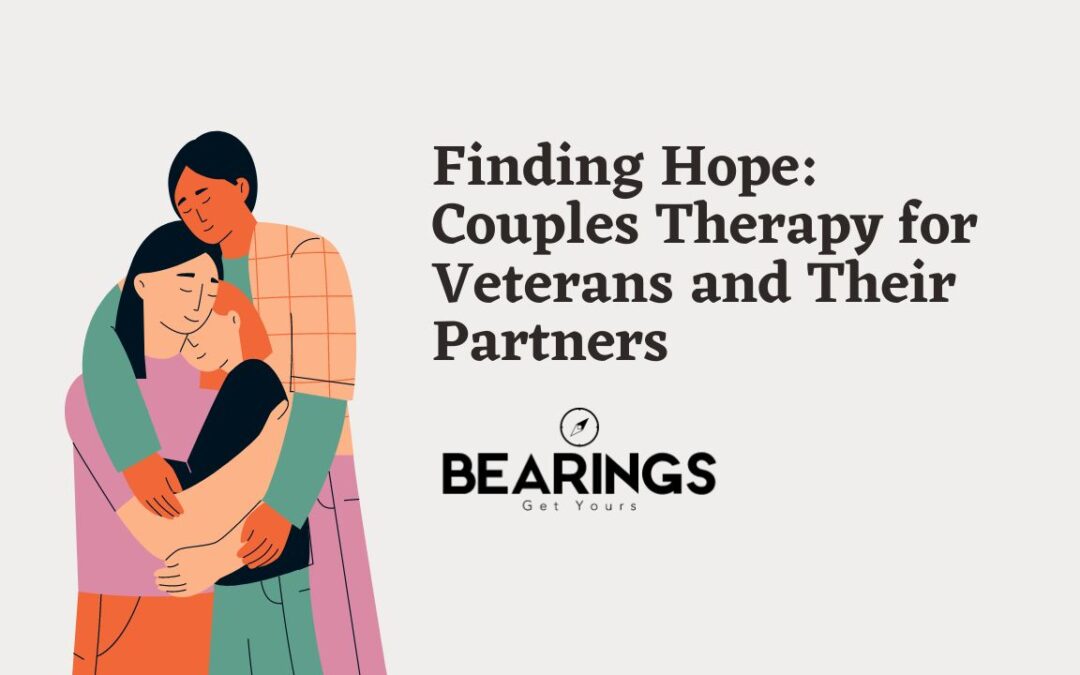Finding Hope: Couples Therapy for Veterans and Their Partners
As a veteran, returning to civilian life can be a challenging and overwhelming experience. Adjusting to a new routine, dealing with emotions from combat, and coping with physical injuries can make the transition difficult. If you are a veteran and you are experiencing relationship problems with your partner, you are not alone. Many veterans and their partners struggle with the transition to civilian life and the impact it can have on their relationship.
How Couples Therapy Can Help
At Bearings Therapy, we understand the unique challenges that veterans and their partners face. We offer couples therapy that is specifically tailored to the needs of veterans and their partners. Our licensed therapists provide a safe and supportive environment for couples to explore their feelings, work through their issues, and find hope for the future.
The Benefits of Couples Therapy for Veterans and Their Partners
Couples therapy can help veterans and their partners in a number of ways, including:
- Improving communication skills
- Building a stronger emotional connection
- Managing conflicts in a healthy way
- Reducing feelings of anxiety and depression
- Improving intimacy and trust
- Creating a shared vision for the future
Our Approach to Couples Therapy
At Bearings Therapy, we take a collaborative approach to couples therapy. We work with both partners to identify their goals and develop a plan to achieve them. Our therapists use evidence-based techniques to help couples build stronger relationships and overcome challenges.
Some of the techniques we use include:
- Gottman Method
- Cognitive Behavioral Conjoint Therapy (CBCT)
- Acceptance and Commitment Therapy (ACT)
We believe that couples therapy is a partnership between the therapist and the couple. We work with each couple to create a safe and supportive environment where they can explore their feelings and work through their issues together.
Contact Bearings Therapy Today
If you are a veteran or the partner of a veteran and you are experiencing relationship problems, Bearings Therapy can help. Our experienced therapists are trained to work with veterans and their partners to help them find hope for the future.
Contact us today to schedule an appointment. You can call us at (214) 892-2158 or fill out our contact form on our contact page.
Frequently Asked Questions
Is couples therapy covered by insurance?
Many insurance plans cover couples therapy. We recommend checking with your insurance provider to see if couples therapy is covered under your plan.
How long does couples therapy last?
The length of couples therapy can vary depending on the needs of the couple. Some couples may see progress in just a few sessions, while others may benefit from longer-term therapy. Our therapists will work with you to develop a treatment plan that meets your unique needs.
What if my partner is hesitant about couples therapy?
It is common for one partner to be hesitant about couples therapy. We encourage both partners to be open and honest about their concerns. Our therapists are trained to work with couples who may be hesitant about couples therapy and can provide support and guidance throughout the process. We also offer individual therapy for those who may want to work on their own before starting couples therapy.
What if my partner and I have different schedules?
We understand that scheduling can be a challenge, especially for couples with busy lives. We offer flexible scheduling options, including evening and weekend appointments, to accommodate the needs of our clients.
What if my partner is not a veteran?
At Bearings Therapy, we welcome couples of all backgrounds and experiences. While our therapy is tailored to meet the needs of veterans and their partners, we are equipped to work with couples from all walks of life.
If you are a veteran or the partner of a veteran and you are struggling in your relationship, don’t hesitate to reach out to Bearings Therapy. We are here to help you find hope for the future and build a stronger, healthier relationship with your partner.


Recent Comments